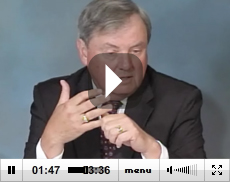Procedural fairness is a natural fit with the work of judges. There are many low-cost changes judges can make with a potential high impact on judicial effectiveness.
The video excerpt to the left is from the National Center for State Courts "Writing Opinions and Orders in Controversial Cases," explains the importance of procedural fairness when writing opinions and orders in controversial cases.
Appellate Judges
Kansas Appellate Judge Steve Leben's paper "Considering Procedural Fairness Concept in the Courts of Utah" highlights ways in which procedural fairness principles can be applied in courts and also examines their application to programs measuring judicial performance.
More advice can be found in "Some Thoughts on the Judge’s Written Work,” prepared for the October 2014 educational conference of the American Judges Association, highlighting ways that procedural-fairness principles can be incorporated into a judge’s written opinions.
The following recommendations, adapted from Judge Burke and Judge Leben's white paper, "Procedural Fairness: A Key Ingredient in Public Satisfaction" highlights specific ideas judges can adopt to boost perceptions of procedural fairness, resulting in higher levels of both litigant satisfaction and compliance with court decisions.
WHAT CAN AN INDIVIDUAL JUDGE DO?
- Join the American Judges Association (AJA), which has for the past several years been leading judges toward better procedural-fairness practices. The AJA has regular educational programming on procedural fairness, and its quarterly journal, Court Review, has published many of the key articles in this field.
- As a matter of practice, explain in understandable language what is about to go on to litigants, witnesses, and jurors. The more they know what to expect, the more likely they will be able to comprehend. Judges need to accept that it is their ultimate responsibility to ensure people understand their processes and orders.
- Learn how to listen better. Listening is not the absence of talking. There are some excellent books about improving listening. The first step is good self-analysis. Each of us has different strengths and weaknesses. All of the literature concludes that you can become a better listener. The local academic community might be a good repository of advice.
- While it is understandable to believe that a lawyer will explain judicial orders, not every litigant has a lawyer who will ensure an order is understood. It's your order. You have a responsibility to explain it in understandable terms.
- Put something on the bench as a mental reminder that patience is a virtue not always easily practiced.
- At the start of a docket, explain the ground rules for what will happen. For example, explain why certain cases will be heard first or why what litigants or defendants can say is limited in time or scope.
- Share and discuss this paper with the courtroom staff. They can play a critical role in giving a judge feedback, reminders, and support.
- Arrange to have yourself videotaped, particularly when you preside in heavy calendars. Ideally, review the tape with a professional or colleagues who will aid your analysis, but even if no one sees it except you (and perhaps a partner or spouse), you can still learn a lot about how you are perceived by the people before you.
- Enlist the local academic community. Professors who specialize in communication and nonverbal behavior can offer great insight.
- Thank people for their patience.

